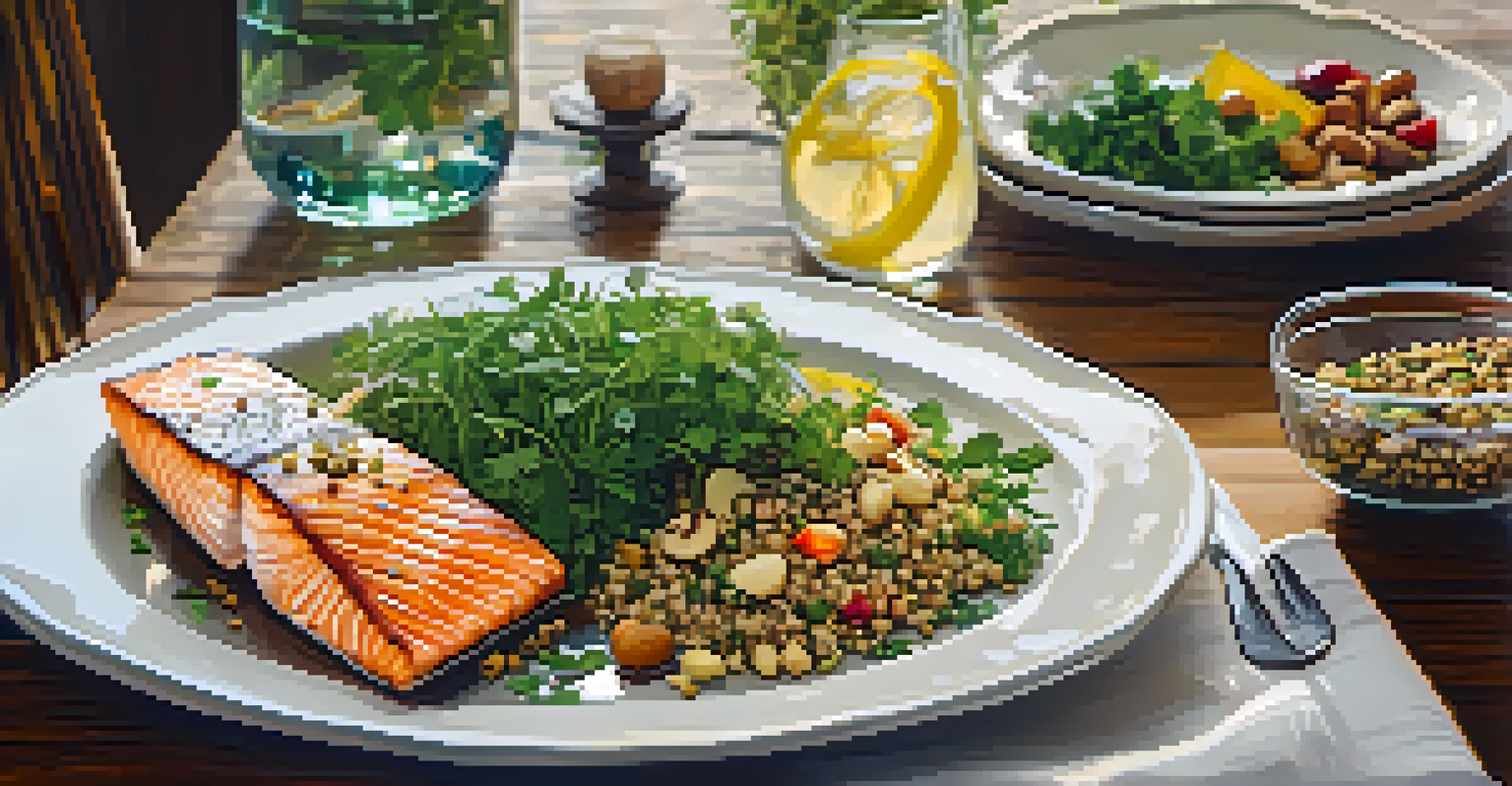Nutrition Myths: Common Misconceptions Debunked

Myth: Carbs Are the Enemy of Weight Loss
Many people believe that cutting carbs is the key to shedding pounds. However, carbohydrates are an essential macronutrient that your body needs for energy. Whole grains, fruits, and vegetables provide fiber and nutrients that support overall health, helping to maintain a balanced diet.
Let food be thy medicine and medicine be thy food.
Instead of avoiding carbs, focus on choosing the right types. Complex carbohydrates, like those found in whole grains and legumes, are digested more slowly, keeping you fuller for longer. This can actually aid in weight management rather than hinder it.
So, don’t fear carbs! Incorporating healthy sources into your meals can lead to better energy levels and satisfaction, making your weight loss journey more sustainable.
Myth: Eating Fat Makes You Fat
For years, fat has been demonized in the world of nutrition, leading many to believe that consuming fat will automatically lead to weight gain. In reality, dietary fat is crucial for various bodily functions, including hormone production and nutrient absorption. Healthy fats, like those from avocados, nuts, and olive oil, are beneficial for your heart and overall health.

It’s important to distinguish between different types of fats. While trans fats and excessive saturated fats can contribute to health issues, unsaturated fats can actually promote weight loss and reduce inflammation. Moderation is key, as is choosing the right sources.
Carbs Can Aid Weight Loss
Choosing the right types of carbohydrates, like whole grains and fruits, can support weight management and overall health.
Incorporating healthy fats into your diet can provide satiety, making you less likely to overeat. So, rather than avoiding fat, embrace it as part of a balanced diet!
Myth: All Processed Foods Are Bad
Processed foods often get a bad rap, leading many to believe that they should be entirely avoided. However, not all processed foods are created equal. Some, like frozen fruits and vegetables, can be just as nutritious as their fresh counterparts, often picked and frozen at peak ripeness.
You are what you eat, so don’t be fast, cheap, easy, or fake.
The key is to look at the nutritional quality of the processed foods you consume. Whole foods that have been minimally processed, such as canned beans or whole-grain bread, can be convenient and healthy options. It’s the highly processed foods laden with sugar, salt, and unhealthy fats that you should be cautious about.
Understanding the spectrum of processed foods can help you make better choices. Aim for a balanced approach that includes both whole and minimally processed options for a nutritious diet.
Myth: You Must Drink 8 Glasses of Water Daily
The often-repeated guideline of drinking eight glasses of water a day may not be as rigid as it seems. Hydration needs vary greatly among individuals based on factors like age, activity level, and climate. While staying hydrated is crucial, there isn’t a one-size-fits-all recommendation that applies to everyone.
In fact, many foods, such as fruits and vegetables, contribute to your daily fluid intake. Additionally, beverages like herbal teas and even coffee can count towards your hydration goals. Listening to your body’s thirst cues is a more effective approach than sticking to a strict number.
Healthy Fats Are Beneficial
Incorporating healthy fats from sources like avocados and nuts can promote satiety and improve heart health.
Ultimately, aim for a hydration strategy that suits your lifestyle and needs. Paying attention to how your body feels can guide you in maintaining optimal hydration without the pressure of hitting a specific number.
Myth: Detox Diets Are Necessary for Good Health
The idea of detox diets can be tempting, especially with the promise of cleansing your body of toxins. However, your body is naturally equipped to detoxify itself through organs like the liver and kidneys. Following extreme detox diets can often lead to nutrient deficiencies and unsustainable eating habits.
Instead of detoxing, focus on incorporating a balanced diet rich in whole foods that support your body’s natural detoxification processes. Foods high in antioxidants, fiber, and essential nutrients can help your body eliminate waste effectively.
Ultimately, a healthy lifestyle—consisting of balanced nutrition, regular exercise, and adequate sleep—will do much more for your wellbeing than a temporary detox diet ever could.
Myth: Snacking Is Unhealthy
Many people associate snacking with unhealthy habits, believing it leads to weight gain or poor nutrition. However, when done mindfully, snacking can actually be a beneficial part of your diet. Healthy snacks can help maintain energy levels and curb hunger between meals, preventing overeating later on.
Choosing nutrient-dense snacks, such as fruits, nuts, or yogurt, can provide essential vitamins and minerals while keeping your energy steady. It’s all about making the right choices and listening to your body’s hunger signals.
Snacking Can Be Healthy
Mindful snacking with nutrient-dense foods can help maintain energy levels and prevent overeating.
So, instead of seeing snacking as a guilty pleasure, embrace it as a chance to nourish your body throughout the day. Opt for wholesome snacks to fuel your activities and support your overall health.
Myth: Supplements Can Replace a Healthy Diet
With the rise of dietary supplements, many may think that they can replace a balanced diet. However, supplements are intended to complement, not substitute, whole foods. While they can be beneficial in addressing specific nutrient deficiencies, they cannot replicate the numerous health benefits that come from consuming a variety of foods.
Whole foods contain a complex mix of nutrients, fiber, and antioxidants that work synergistically to promote health. Relying solely on supplements can lead to imbalances and missed opportunities for consuming important nutrients.

So, prioritize a diverse diet filled with fruits, vegetables, whole grains, and lean proteins. Use supplements as a safety net when needed, but remember that nothing can replace the power of real food.